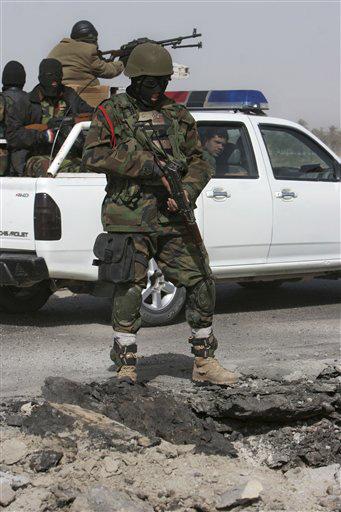Iraqi lawmaker says al-Sadr statement on cease-fire to be read in mosques on Friday

Iraqi policeman stands by a road side bomb crater that struck a British patrol on Wednesday night in Basra, Iraq, 550 kilometers (340 miles) southeast of Baghdad, Thursday, Feb. 21, 2008. There were no reports on possible casualties. Nabil al-Jurani, The Associated Press
February 21, 2008
BAGHDAD – Radical Shiite cleric Muqtada al-Sadr will have a statement read in mosques at Friday prayer services addressing whether his Mahdi Army will extend a six-month cease-fire that has helped reduce violence throughout Iraq, a Shiite lawmaker said.
The Iraqi legislator, who spoke on condition of anonymity because he was not authorized to release the information, told The Associated Press on Thursday that “tomorrow there will be a statement from Sayed Muqtada to be read during Friday prayers.”
“No one can predict what decision will be taken,” he said. “Whether it will be an extension of the freeze or not.”
Yet at a rally Thursday in Baghdad’s Sadr City neighborhood to commemorate the fourth anniversary of a Shiite uprising against U.S. forces, Sheik Jamal al-Sudani, the head of the local Sadr media office, addressed a crowd in the thousands with nonviolent rhetoric.
“We have to fight by peaceful ways,” he said. “We have to think of another way to martyrdom, this time not by attack or assassination but by a doctrinal stand.”
Get The Daily Illini in your inbox!
Al-Sadr’s decision to take his militia off the streets last August has been widely credited with improving security throughout Iraq, along with a boost in American troop levels and Sunni fighters turning against their former allies from al-Qaida in Iraq.
Sheik Salah al-Obeidi, a spokesman for al-Sadr in the Shiite holy city of Najaf, said Wednesday that if the cleric failed to issue a statement by Saturday saying the cease-fire was extended, “then that means the freeze is over.”
The Shiite lawmaker said the statement being released Friday does address the cease-fire, but he could not say whether it extended or ended it.
Some of al-Sadr’s followers, frustrated by U.S. raids against what it terms splinter groups from the Mahdi Army, have called for their leader to put his fighters back on the streets, a step that could drastically worsen sectarian violence.
Rear Adm. Gregory Smith, a U.S. military spokesman, said that under current conditions, killings are still dropping. He said the number of civilian deaths in Baghdad fell from 1,087 men, women and children killed in February 2007 to 178 in the first month of this year.
“Al-Sayyid Muqtada al-Sadr’s cease-fire has been helpful in reducing violence and has led to improved security in Iraq. We would welcome the extension of the cease-fire as a positive step,” Smith told The Associated Press, using an honorific reserved for descendants of the Prophet Muhammad.
Meanwhile, in the southern city of Basra, four British troops were wounded by a roadside bomb and Iraqi police said authorities were searching Thursday for gunmen who clashed with the British following the blast.
Britain’s Ministry of Defense said the troops were injured in what it described as an explosion outside their base. The attack occurred Wednesday night and was followed by clashes, Basra police Col. Kareem al-Zaidi said.
Some roads were closed in Basra and occasional gunfire could be heard Thursday as what al-Zaidi said were Iraqi army units hunted for the gunmen.
Basra, about 340 miles southeast of Baghdad, is Iraq’s second-largest city – an oil-rich area that is predominantly Shiite. The British handed control of the area back to the Iraqi government in December, although the British still have bases in the region.
The explosion there took place on a day when the U.S. military announced five troop deaths and a suicide bomber in troubled Diyala province claimed the lives of at least six people.
The U.S. deaths included three soldiers killed Tuesday night by a roadside bomb in northwestern Baghdad; one soldier killed and three wounded in a rocket-propelled grenade attack in the northwestern city of Mosul, and a soldier killed by a roadside bomb who was assigned to Multi-National Division-Center, which is responsible for territory south of Baghdad.
The U.S. military also put the figure from a Wednesday suicide bombing in troubled Diyala province at six dead and 18 wounded.
In a political development, Iraq’s Sunni vice president, Tariq al-Hashimi, has signed off on a draft of an amnesty law, one of three key pieces of legislation passed by the Parliament last week, his office said Thursday.
The measure, which would grant limited amnesty to detainees in Iraqi custody, has yet to be signed by the other two members of the three-member presidency council – President Jalal Talabani and the Shiite Vice President Adel Abdul-Mahdi.
Associated Press writers Sinan Salaheddin and Hamid Ahmed contributed to this report.






